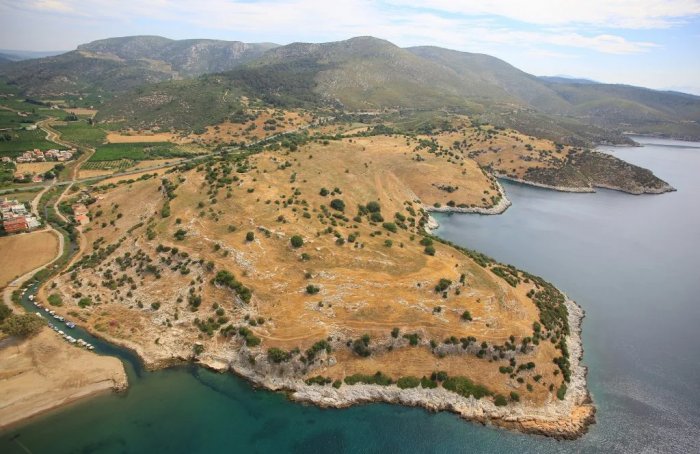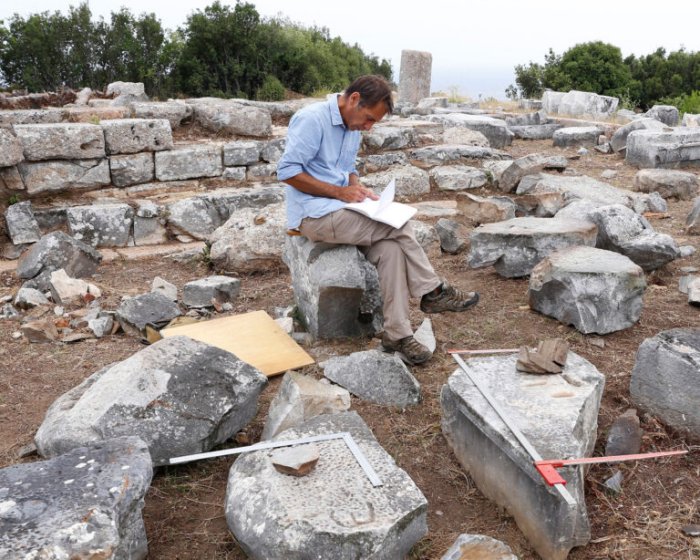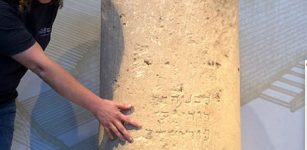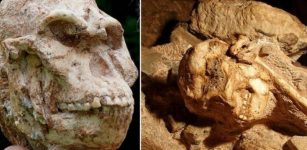Gold Coins Found In The Ancient City Of Notion Tell A Story Of Misfortune
Jan Bartek - AncientPages.com - A team of researchers, led by a University of Michigan archaeologist, has made a significant discovery during excavations in the ancient Greek city of Notion, located in western Turkey. The team unearthed a collection of gold coins believed to have been used to compensate mercenary soldiers.
These coins, found buried in a small container, feature a distinctive design of a kneeling archer, characteristic of the Persian daric. The Persian Empire issued these gold coins, likely minting them in Sardis, a city about 60 miles northeast of Notion.
An aerial view of the Notion archaeological site, looking northeast, with the Hales River to the west. Credit: Notion Archaeological Project
The research team has dated this coin hoard to the fifth century B.C. This discovery is particularly valuable as it provides historians with additional data to enhance their understanding of the Persian daric's historical timeline and significance. Such findings contribute to our knowledge of ancient economic systems and military practices in the region during that period.
"The discovery of such a valuable find in a controlled archaeological excavation is very rare.
“No one ever buries a hoard of coins, especially precious metal coins, without intending to retrieve it. So only the gravest misfortune can explain the preservation of such a treasure," said U-M archaeologist Christopher Ratté, professor of classical studies, curator of the Kelsey Museum of Archaeology and director of the Notion Archaeological Project.
Archaeologists discovered a pot of gold Persian coins, called darics, at the ancient city of Notion in Turkey. The coins show a figure of a kneeling archer, the characteristic design of the Persian daric, a type of gold coin issued by the Persian Empire. Photo courtesy of Notion Archaeological Project, University of Michigan
Darics were minted from the late sixth century B.C. until Alexander the Great's conquest of the Persian empire in 330 B.C. The design of the coins remained the same, with only minor stylistic differences. Researchers have tried to arrange the coins chronologically by analyzing those stylistic differences. One of the important aspects of the newly discovered hoard is that it is independently dated by other associated artifacts.
“This hoard will provide a firm date that can serve as an anchor to help fix the chronology of the (entire sequence of coins),” Ratté said.
Andrew Meadows of Oxford University states that the hoard's archaeological context could help refine the chronology of Achaemenid gold coinage, calling it a "spectacular find of the highest importance."Excavations in Notion began in 2022, with the coins discovered in 2023. The Turkish Ministry of Culture and Tourism recently permitted the public announcement of the find, which remains in Turkey. While Notion's best-preserved remains date to the Hellenistic period (3rd-1st centuries BC), evidence suggests earlier habitation.
Archaeologist Christopher Ratté records architectural details of the Temple of Athena at Notion in western Turkey. Photo courtesy of Notion Archaeological Project, University of Michigan
Excavation of a central courtyard house revealed 5th-century BC pottery fragments in older walls. The coin hoard, buried in a small pot, was found beneath the courtyard in July 2023.
“The hoard was found in the corner of a room in a structure buried beneath the Hellenistic house. Presumably, it was stored there for safekeeping and for some reason never recovered,” Ratté said in a press release. “According to the Greek historian Xenophon, a single daric was equivalent to a soldier’s pay for one month.”
Researchers believe that one of the primary uses of the daric was to pay mercenary troops, and it is possible that this hoard was associated with military operations in the area around Notion.
Ratté also notes that most hoards of darics have been found not by archaeologists in scientific excavations, but by looters who have “no concern for history.”
“An archaeological find without contextual information is like a person suffering from amnesia — a person without memories,” Ratté said. “It is still interesting and important, but the loss of knowledge is incalculable. In the case of this hoard, we know precisely where it was found, and we have a great deal of circumstantial evidence for when it was deposited, probably in the late fifth century B.C.”
The city of Notion was incorporated into the Persian Empire with other Greek cities along Turkey's western coast during the mid-sixth century B.C. It briefly gained freedom from Persian rule in the early fifth century B.C., only to be reintegrated into the Persian Empire in the early fourth century B.C. The city remained under Persian control until Alexander the Great's conquest in 334 B.C.
Between 430 B.C. and 427 B.C., Persian sympathizers from nearby Colophon, aided by Greek and non-Greek mercenaries, occupied part of Notion. In 427 B.C., Athenian general Paches attacked, eliminating the pro-Persian mercenaries after luring their commander into a trap. The Persian sympathizers were expelled, and Notion was reorganized under Athenian supervision.
See also: More Archaeology News
This sequence of events could explain the deposition and loss of the hoard in question, though other explanations remain plausible. In 406 B.C., a decisive naval battle between Athens and Sparta occurred off Notion's coast, which the Athenians used as a naval base. Western Anatolia saw renewed conflict in the 360s B.C. when several Persian governors rebelled against central authorities.
Notion's harbor, recognized as a significant military asset, was likely fortified during this period. The established chronology of Persian coinage suggests a fourth-century B.C. date for the hoard discovered at Notion.
Written by Jan Bartek - AncientPages.com Staff Writer























